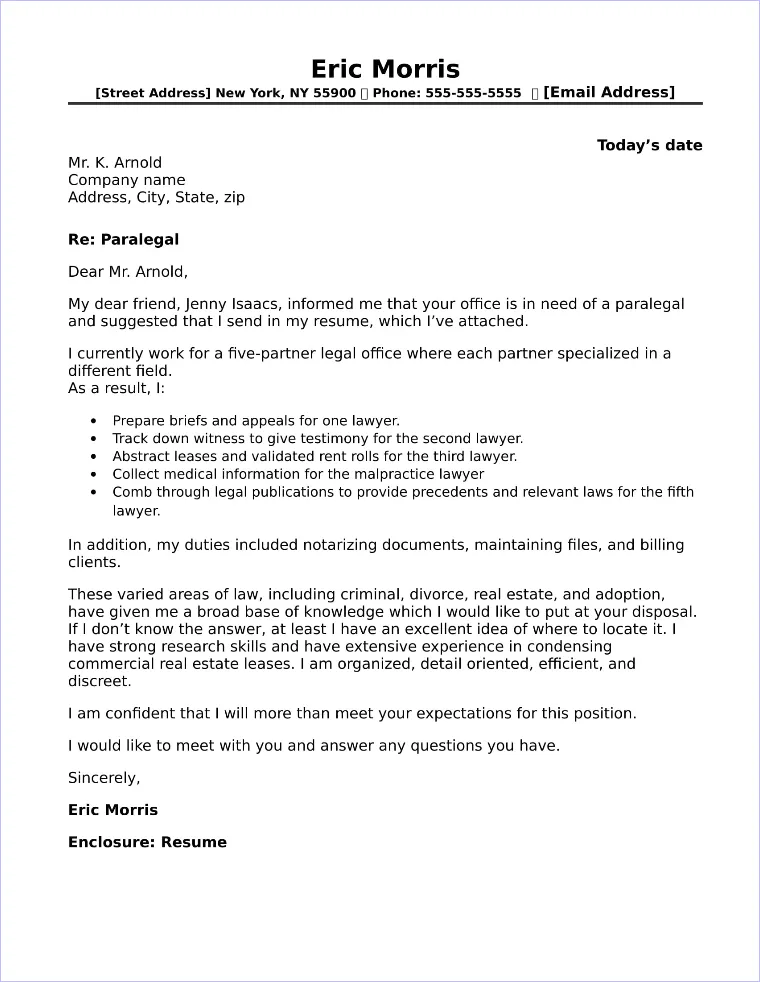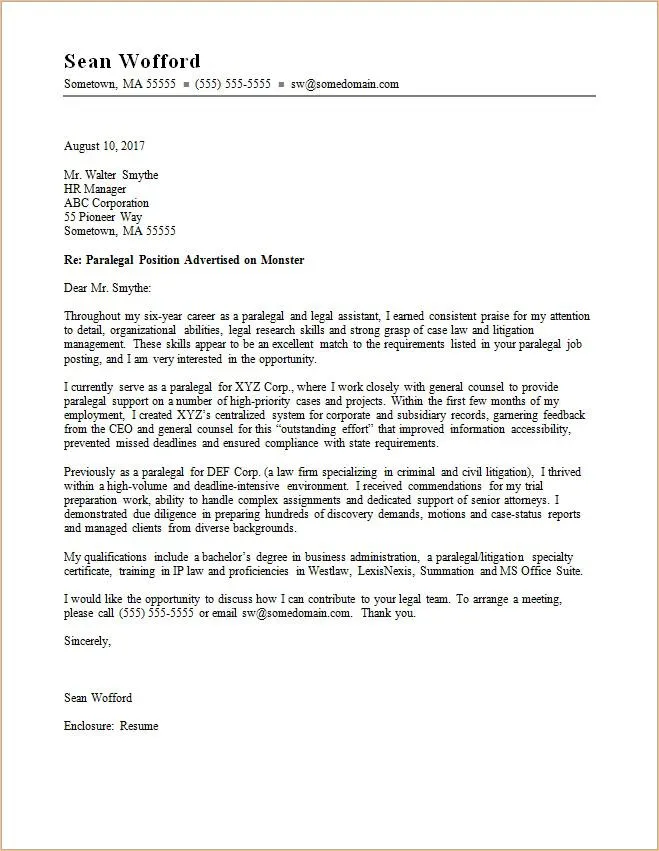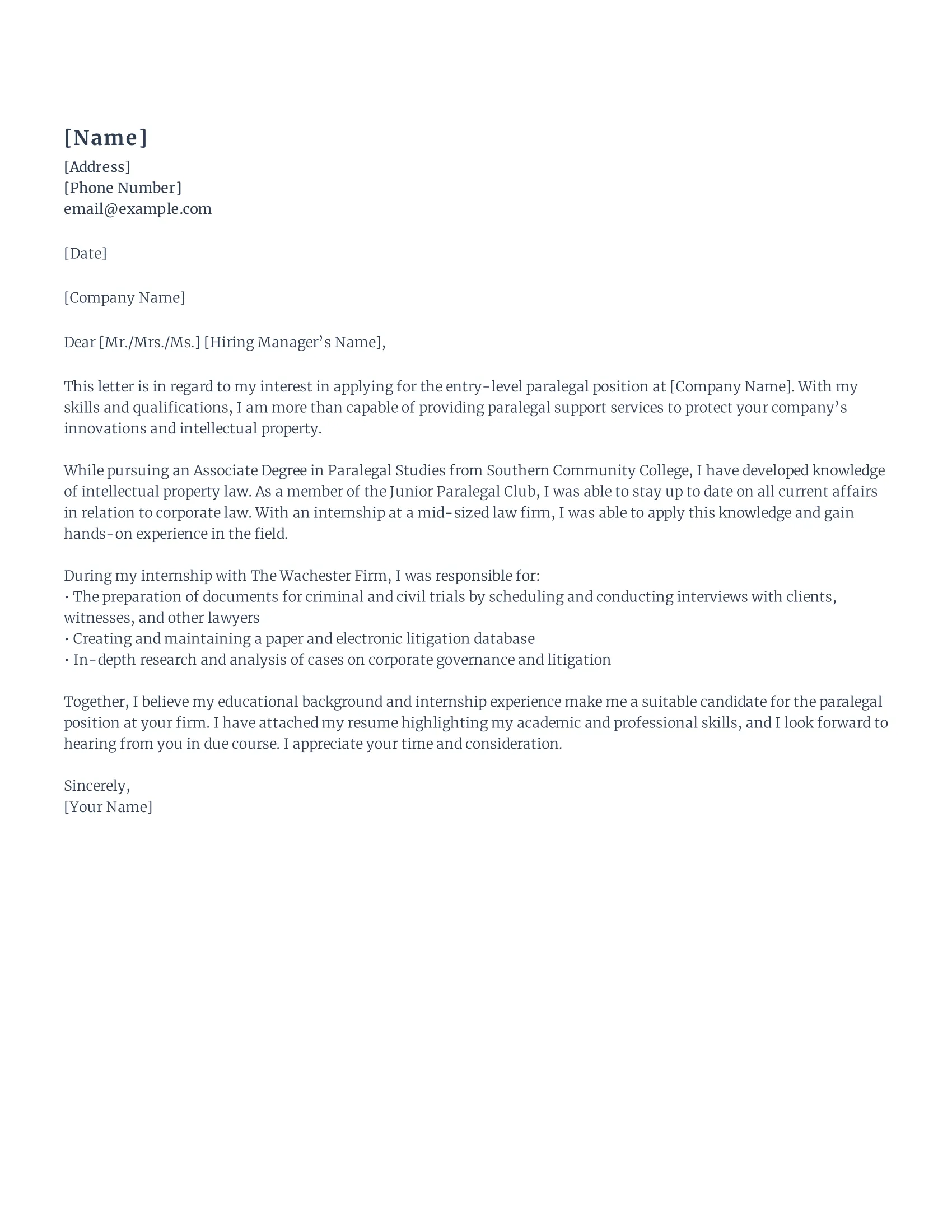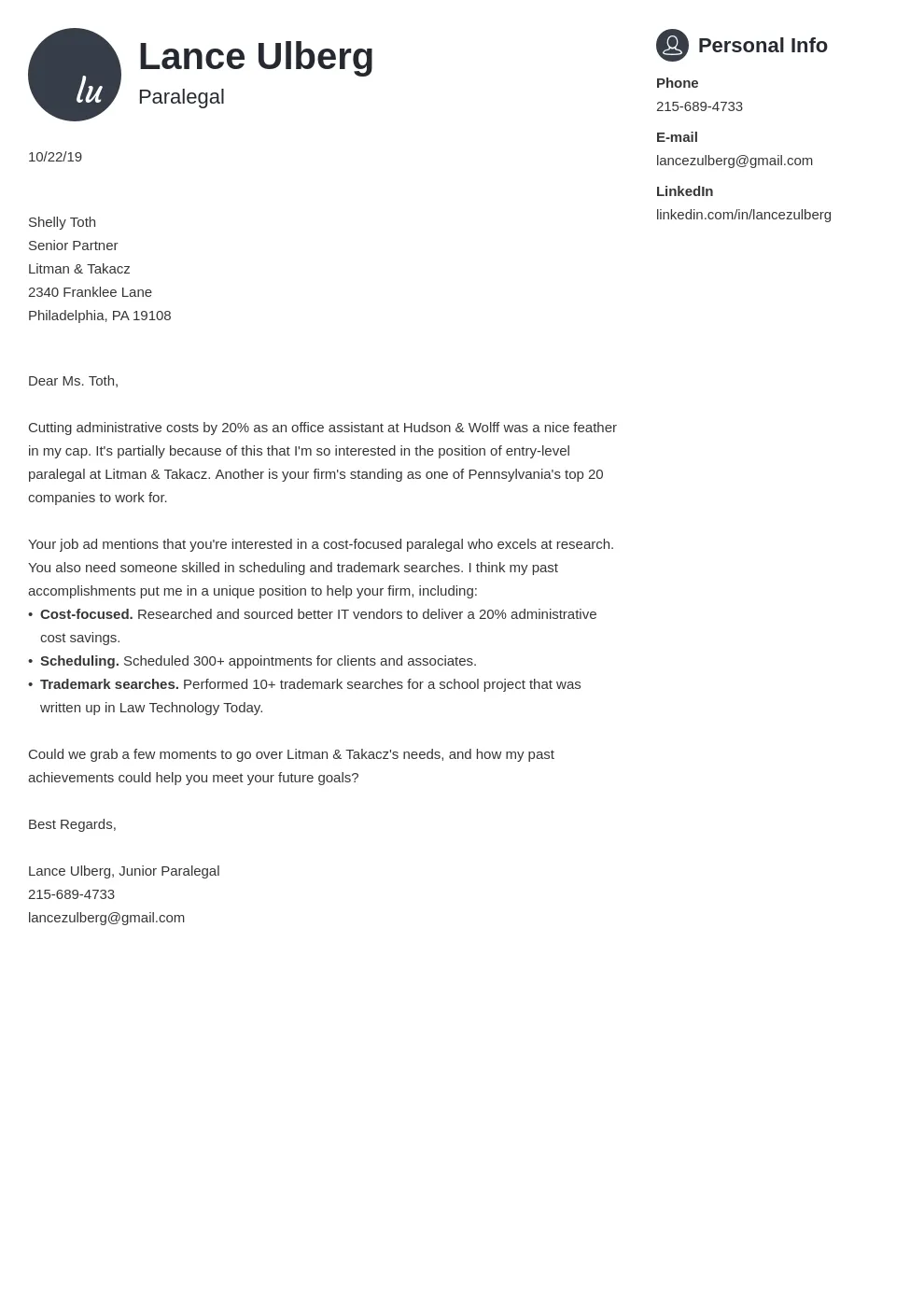Paralegal Cover Letter Tips Overview
A paralegal cover letter is your first opportunity to make a positive impression on a potential employer. It’s your chance to showcase your skills, experience, and personality. A well-crafted cover letter complements your resume and provides a more detailed narrative of your qualifications and career aspirations. It allows you to highlight specific achievements and explain how your skills align with the job requirements. This guide will provide you with 5 essential tips for crafting a successful paralegal cover letter that will capture the attention of hiring managers and increase your chances of landing an interview. By following these guidelines, you can create a compelling cover letter that sets you apart from other candidates.
Highlight Your Paralegal Skills
Your cover letter should begin by clearly stating the paralegal skills you possess. These skills are the foundation of your ability to perform the job successfully, so emphasize your proficiency in areas such as legal research, drafting legal documents, case management, and client communication. Be specific about your skills; for instance, rather than simply stating “legal research,” mention specific databases you are proficient in, like Westlaw or LexisNexis. Similarly, if you have experience with a particular type of law, such as corporate law or litigation, make sure to specify that. You could also mention any software proficiencies, like document management systems or case management software. Highlighting these skills at the outset immediately shows the employer that you meet their basic requirements. This helps you get past the initial screening process and be considered for the next stage of the hiring process.
Showcase Relevant Experience

Showcasing your relevant experience is essential to demonstrating your qualifications for the paralegal role. This section of your cover letter should provide a brief overview of your work history, focusing on experiences that directly relate to the job you are applying for. For each previous role, describe your key responsibilities and the tasks you performed. Emphasize situations where you successfully handled complex legal tasks, managed client files, or assisted in trial preparation. If you have experience in the specific area of law the law firm specializes in, this is the place to highlight it. The goal is to connect your past experiences with the needs of the potential employer, making it clear that you have the practical skills and knowledge required to succeed in the paralegal position. Providing concrete examples will help the hiring manager understand how you can contribute to their team.
Quantify Your Accomplishments
Quantifying your accomplishments is a crucial step in making your cover letter impactful. Instead of simply listing your job responsibilities, provide specific examples of your achievements and the results you obtained. For example, instead of saying “Managed client files,” you might state, “Managed a caseload of 75+ client files, ensuring 100% compliance with deadlines and maintaining organized records.” If you helped improve efficiency or reduced costs, provide quantifiable metrics. Maybe you streamlined a filing process that saved the firm a certain amount of time or money. This type of detail demonstrates the value you can bring to the role. By using numbers, percentages, and other quantifiable data, you provide concrete evidence of your skills and abilities, making your cover letter much more compelling and persuasive.
Tailor Your Cover Letter
One of the most common mistakes job seekers make is sending out generic cover letters. To stand out, it’s essential to tailor your cover letter to each specific job and law firm. Generic letters do not demonstrate that you have carefully considered the role or that you are genuinely interested in the firm. Begin by carefully reading the job description and identifying the key requirements and qualifications they are seeking. Then, use this information to customize your cover letter, highlighting how your skills and experience align with the specific needs of the position. This shows the employer that you have taken the time to understand their requirements and that you are a good fit for their team. Also, remember to research the law firm, show that you have insights into their practice areas, and align your career goals with their mission and values.
Research the Law Firm

Before submitting your cover letter, take some time to research the law firm. Visit their website, read about their practice areas, and learn about their attorneys and their recent cases. This information will help you tailor your letter and demonstrate your genuine interest in the firm. You can mention specific cases they have worked on or comment on their areas of specialization. This shows that you have invested time and effort into understanding the firm and that you are not just sending out a generic application. You can also use this research to identify any connections or shared interests that you can highlight in your cover letter. This level of personalization can significantly improve your chances of getting an interview.
Address the Specific Job Requirements
Carefully examine the job description and address each of the specific requirements. The employer has listed those requirements for a reason, so demonstrating how you meet those requirements is essential. Highlight your experience in those areas, use the same keywords, and clearly explain how your skills and experience align with the role. If the job description emphasizes any particular software, legal expertise, or task, make sure to address it directly in your cover letter. Even if you don’t have direct experience with a requirement, you can discuss how you are willing and able to learn. By addressing each of the requirements, you assure the hiring manager that you are the right person for the job. It shows that you are not only qualified but that you also pay attention to details and are eager to meet the needs of the firm.
Use Strong Action Verbs
Using strong action verbs is critical to making your cover letter dynamic and compelling. Action verbs immediately grab the reader’s attention and showcase your skills and accomplishments. Instead of using passive language, such as “was responsible for,” use active verbs like “managed,” “implemented,” “drafted,” “researched,” or “negotiated.” Using strong action verbs brings your experience to life and provides a clear picture of your accomplishments. This will make your cover letter more engaging and memorable. This is especially important when describing your responsibilities and achievements in previous roles. Additionally, it provides a better indication of the impact you made in those positions. This helps to demonstrate your capabilities more effectively, making you a stronger candidate overall.
Proofread and Edit Meticulously

Proofreading and editing your cover letter meticulously is absolutely essential. Errors in grammar, spelling, or punctuation can undermine your credibility and create a negative impression. Ensure that your cover letter is free from any mistakes by carefully reviewing it yourself and asking someone else to read it. Misspellings or grammatical errors suggest a lack of attention to detail, which is a crucial quality for a paralegal. Make sure that names, dates, and any specific details about the law firm or the job are correct. A well-written, error-free cover letter shows that you are professional and take pride in your work. Proofreading is a critical step in the job application process and should not be overlooked.
Formatting Your Cover Letter
Pay attention to the formatting of your cover letter. Use a clear and professional font, such as Times New Roman or Arial. Keep the layout clean and easy to read, with appropriate spacing between paragraphs. Use bullet points to make it easier to scan your accomplishments and skills. Avoid using overly decorative fonts or unusual layouts, which can distract the reader. Maintain a consistent format throughout the letter to give it a professional appearance. A well-formatted cover letter showcases your professionalism and attention to detail, which can significantly increase your chances of being considered for an interview.
